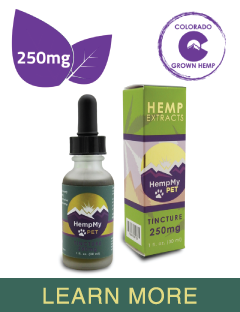Marijuana Toxicity in Dogs

By Kevin T. Fitzgerald, PhD, DVM, DABVP
Staff Veterinarian VCA Alameda East Veterinary Hospital
In the last 25 years, the decriminalization and legalization of marijuana has been a highly controversial topic. Recently, several states have allowed the medicinal use of marijuana under certain circumstances and, in 2012, Colorado and Washington state decriminalized possession of small amounts of marijuana for personal use. Similar legislation is currently under consideration in several other states. Due to these changes with regard to the legal status of marijuana making it more readily accessible, an increase in the number of accidental intoxications in domestic animals (especially dogs) can be expected.
Dogs and cats are very susceptible to marijuana toxicosis but dogs are much more often affected. Marijuana poisoning in dogs from inhalation of second-hand smoke is possible, but ingestion of baked products (cookies, brownies, candy, suckers, etc.) is more often the cause. While a person may ingest one cookie or brownie to achieve the desired effect, an unsupervised dog with access to a countertop or low table may consume a whole tin of marijuana brownies or an entire plate of cookies. People ingest marijuana products knowingly and animals unintentionally. Unlike inhalation, the psychoactive effects of the drug following ingestion are not immediate. Peak brain levels of the active ingredient (tetrahydrocannabinol or THC) after ingestion may not be achieved for a few hours but may last much longer than through inhalation. Thus, people or animals ingesting marijuana cannot control the level and length of the intoxication making it difficult for dog owners and veterinary care providers.
Increasingly, dogs, through ingestion of marijuana food products, are becoming exposed to baked goods made with concentrated THC butter. This is made by boiling parts of the plant to extract the highly fat-binding THC, then adding butter to absorb the THC and allow the psychoactive ingredient to absorb into the butter. Then the butter, after being sautéed in THC and with the plant material strained out to make the food items free of the crunchy taste of the plant, is very high in THC content. The butter can achieve THC concentrations higher than in the plant. Although the margin of safety following marijuana ingestion has always been documented to be very high (minimum lethal oral dose greater than 3 grams per kilogram), recently a report out of Colorado State Veterinary College reported deaths in 2 dogs after eating foods containing concentrated THC butter.
In dogs, clinical signs of marijuana toxicity include stumbling, incoordination, hypersalivation, disorientation, lower body temperature, dilated pupils, vomiting and tremors. In one study, nearly half of the affected dogs displayed urinary incontinence. Dogs may also display vocalization, stupor, apprehension, and hyperexcitability. Stumbling and depression are among the most frequently documented signs. Signs can vary with the amount of the drug ingested, the size and age of the dog, and underlying medical conditions.
Marijuana ingestion in dogs is diagnosed mainly by history and clinical signs. Human urine drug screening tests are available but may vary in their specificity and sensitivity. There is no specific antidote for marijuana poisoning. Fortunately, for the majority of cases, this toxicosis in dogs is not fatal. Your veterinarian may initiate treatment to counter the clinical signs (anxiety, vomiting, and temperature changes) and observe the dog closely for respiratory depression. The thrust of treatment for marijuana exposure in dogs is supportive. Dogs suspected of ingesting marijuana or displaying the clinical signs should be seen by their veterinarian immediately.
Although recovery in dogs following poisoning with marijuana may be prolonged (up to 3 to 5 days), the majority of dogs recover completely with no long-term adverse effects. Dogs ingesting the more concentrated THC butter may require more involved and prolonged treatment. Recovery time is closely dependent upon the dose ingested. Marijuana must never be kept in a dog’s environment. Prevention of marijuana poisoning in dogs depends upon educating the public about the potentially hazardous effects that the drug can have on pets that ingest it. It must be remembered, as for any animals medical emergency, your veterinarian is as far away as the telephone.







